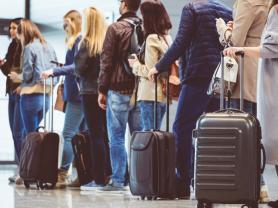New USCIS Policy Places Certain Students and Exchange Visitors at Serious Risk of Being Barred from the United States
 In another attempt to restrict legal immigration, U.S. Citizenship and Immigration Services (USCIS) announced a policy change to the way foreign students and exchange visitors accrue unlawful presence—a legal term used to describe any time spent in the United States after a foreign national’s period of authorized stay has ended.
In another attempt to restrict legal immigration, U.S. Citizenship and Immigration Services (USCIS) announced a policy change to the way foreign students and exchange visitors accrue unlawful presence—a legal term used to describe any time spent in the United States after a foreign national’s period of authorized stay has ended.
Effective August 9, 2018, this policy will directly impact foreign nationals currently or previously in academic student (F-1), vocational student (M-1), and exchange visitor (J-1) status and their spouses and children in the related dependent status. All three are nonimmigrant visa classifications that permit foreign nationals to come to the United States temporarily.
The new policy will significantly impact how “unlawful presence” is calculated—resulting in these noncitizens accruing unlawful presence at an earlier point in time. The accrual of “unlawful presence” can have harsh consequences. Generally, a nonimmigrant who leaves the United States after being unlawfully present in the United States for more than 180 days, but less than one year, is barred from returning for three years. The bar to returning becomes ten years if the person was unlawfully present for one year or longer. Children under age 18 do not accrue unlawful presence.
The new policy ignores existing limits on the accrual of unlawful presence which does not begin until after a nonimmigrant’s authorized period of stay ends. Generally, the authorized period of stay would end on the day after (1) the last day of admission when the length of time was specified, or (2) an immigration judge or a USCIS officer finds that a status violation occurred. Most nonimmigrants are authorized to remain in the United States until a specific date. In contrast, those admitted as F-1 students or J-1 visitors are frequently authorized to stay for the duration of their status because so many variables affect the length of time that they would be authorized to remain in the United States.
Under USCIS’ new policy, the day after an event that is considered by the agency to be a violation of F, M, or J status in most cases will now be the starting date for calculating unlawful presence.
For example, an F-1 student with duration of status had permission to work on campus for 20 hours per week while school was in session. One week, she inadvertently worked three extra hours. Under the current policy, if an employer later filed an H-1B (specialty occupation) petition for her, with a change of status request, USCIS could approve the H-1B petition but deny the change of status because the three extra work hours were a technical violation of F-1 status. She would begin to accrue unlawful presence beginning the day after the USCIS official denied the change of status. If she timely left the United States, she could apply for and be issued an H-1B visa abroad and then admitted to the United States in H-1B status, so long as she was otherwise eligible.
Under the new policy, if she exceeded the 20-hour limit on August 1, 2019, and USCIS denied the change of status on November 1, 2020, she would accrue unlawful presence from August 2, 2019, and even if she left the United States on November 2, she would be barred from returning for ten years.
As a result, USCIS’ unlawful presence determinations will be harsher for foreign nationals who have been in these visa categories than for other nonimmigrants. Moreover, if found to be “unlawfully present” under the new policy, their status in the United States could be revoked, they could become ineligible to apply for permanent residence in the United States, and, if they leave the United States, they could be barred for years from returning.
A spouse or child in F, M, or J dependent status is treated even more unreasonably—as after the fact, USCIS can find that they were out of status and accruing unlawful presence (unless the child is under 18), solely due to their relative’s status violation. For example, if an F-1 student accidentally dropped slightly below the required number of credit hours for a full course of study, and years later a USCIS officer determined that the F-1’s mistake was a status violation, the F-2 spouse also would be out of status and accruing unlawful presence.
This is an overly punitive and unnecessary change and yet another attempt to restrict immigration laws and make the United States less welcoming.
Contact Claudine Gasana Student Visa Attorney Houston, TX
This article is provided for information purposes. Should you have any questions or be interested to learn more about this topic, contact Immigration Attorney Claudine Umuhire Gasana at [email protected] or call us at 281-809-5599 or 713-836-9376
Attorney Gasana offers a variety of immigration services to the greater Houston area, including:
- Business and Employment Immigration
- Family-based immigration
- Naturalization assistance & US Citizenship
- Green Card (LPR)
Visas
such as:
Fiance Visa K-1 / K-2, B-1, B-2, L-1 Work Visa, E-1 Treaty Trader, E-2 Investor, P Visas, F-1 and more.
Gasana is also a top H1B Lawyer in Houston!
BY LESLIE DELLON IN ADJUSTMENT OF STATUS, BENEFITS & RELIEF, BUSINESS & THE WORKFORCE, EMPLOYMENT AUTHORIZATION, REFORM AT THE AMERICAN IMMIGRATION COUNCIL
